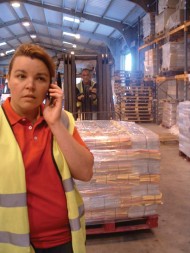 Sometimes it’s difficult to know where to look for straightforward but authoritative advice about the safe operation of fork lift trucks -especially if you have a very specific question. Which part of the maze of legislation, guidance and best practice will have the answer you’re looking for?
Sometimes it’s difficult to know where to look for straightforward but authoritative advice about the safe operation of fork lift trucks -especially if you have a very specific question. Which part of the maze of legislation, guidance and best practice will have the answer you’re looking for?
The Fork Lift Truck Association is an excellent point of contact, with the knowledge and experience to make sense of all this important information. It receives dozens of enquiries from all kinds of fork truck users – often looking for simple, once-and-for-all responses to lingering queries and ‘grey areas’.
Indeed, the Association maintains an extensive online library of fact sheets at www.fork-truck.org.uk/fact-sheets, making it easier to find answers on the most important and frequently raised safety issues.
Some of the more interesting questions the FLTA has answered lately include…
Is it illegal to use a mobile phone whilst operating a fork lift truck?
There’s no specific law against using a mobile phone while operating a fork lift truck (unless you’re driving it on the road)… but it’s a very bad idea.
(In the FLTA’s view, it’s unsafe on a public road, and the work environment is certainly no less hazardous, so it would be good practice to ban it.)
Hands-free mobile phones are also generally recognised as a potential distraction, and so are not recommended; and especially not for personal use. There may be a genuine operational reason to use one – such as communication between a truck operator and personnel on a non-integrated working platform – but purpose-designed communication systems are clearly preferable.
In any case, the method of communication used should certainly be part of your risk assessment.
Do you need special training to work a hand pallet truck?
Yes: absolutely. The Provision and Use of Work Equipment Regulations 1998 (PUWER 98) make it very clear that adequate training must be provided for all persons using work equipment – and their supervisors as well.
These regulations cover all kinds of hand controlled pallet trucks, from simple manual pump trucks to complex electric stackers. The training requirements will depend upon the type of equipment and the tasks performed, but should certainly include its proper use, the risks involved, and the precautions to be taken. You may be able to provide some or all of this in house – but remember that it still needs to be formally recorded.
There are many accidents in the workplace involving hand pallet trucks: do not underestimate the training requirements involved.
Can I drive my fork lift truck on a public road?
 Generally speaking the answer is yes, but the truck must be registered, taxed and insured for road use, like any other vehicle. In addition, the operator must hold an appropriate driving license. If the truck will never travel more than 1,000 yards on the road then the requirements are quite straightforward. If you may need to drive longer distances, then ask you dealer/maintenance provider for advice.
Generally speaking the answer is yes, but the truck must be registered, taxed and insured for road use, like any other vehicle. In addition, the operator must hold an appropriate driving license. If the truck will never travel more than 1,000 yards on the road then the requirements are quite straightforward. If you may need to drive longer distances, then ask you dealer/maintenance provider for advice.
The rules for registration are fairly simple to comply with – but tricky to understand, because the information comes from several different government departments. To help, the FLTA has brought all the relevant guidance together in one comprehensive and straightforward technical bulletin, which is available to purchase… or free to members of the FLTA and its Safe User Group.
Remember: no matter how short the journey, if you’re using a public road you DO need to insure and register the truck (even if you’re only crossing a road or unloading a lorry parked on the street).
Do you have a safety question?
Valuable answers are added regularly to this online resource, but for them to be useful, it’s important to know what advice you need. So if there’s a burning issue which you think needs addressing, please get in touch via the request form on the FLTA website www.fork-truck.org.uk.
FLTA




Comments are closed.